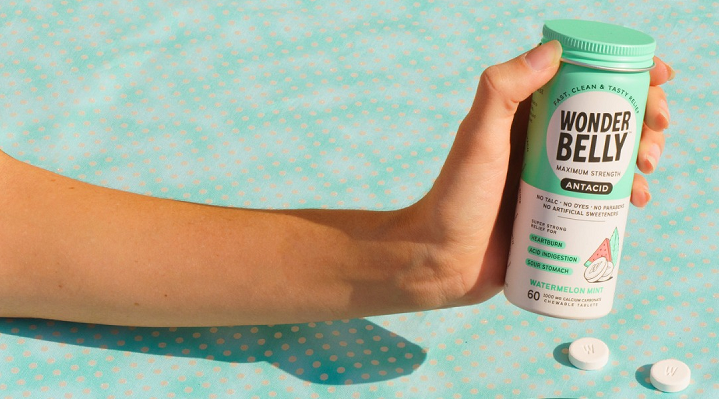When you think of burgeoning retail markets, antacids may not be the first one that comes to mind. However, according to global market research consulting firm Market Data Forecast, the North American antacids market was valued at US$5.38 billion in 2023 and is expected to grow at a compound annual growth rate of 4.6 per cent to US$6.37 billion by 2028. One brand that is already keyed into this growing field is Wonderbelly. Launched in July 2022, the company has seen rapid-fire growth sinc
rowth since its launch, having raised over US$5 million in capital from investors; including Brand Project, Slow, AF Ventures, and Sweet Leaf Tea founder Clayton Christopher.
What are the factors driving Wonderbelly’s success in this expanding field, and what does it potentially say about the future of the over-the-counter pharmaceutical market?
Wonderbelly’s origin story
Like many of the most successful products launched to market, the concept for Wonderbelly came from a personal place.
The brand’s co-founder Lucas Kraft, who runs the business with his brother Noah, has had an ongoing battle with bulimia since he was 15 years old. Though Kraft is currently in recovery, he found that he still had residual health issues to deal with, like heartburn.
While he found some relief from brand-name over-the-counter medications like Tums or Pepto Bismol, his reliance on these drugs shifted during the pandemic. In April 2020, there was a mass recall on Zantac because it contained a carcinogenic ingredient.
This prompted Kraft to look at the ingredients in his medicine cabinet, including talc and titanium dioxide, which he no longer wanted to ingest on a regular basis. That’s where the idea for Wonderbelly came in.
Wonderbelly is a digestive health company that currently offers chewable tablets in a variety of flavors, like fruity cereal, strawberry milkshake, or lemon sorbet, to provide relief for gastrointestinal issues, such as heartburn and acid indigestion.
The brand launched in July 2022 with a direct-to-consumer site, and has since expanded to multiple grocery stores and medicinal distributors. In March 2023, Wonderbelly launched at over 650 Target locations and can be purchased from bricks-and-mortar stores and online retailers like Meijer, Grove, Thrive, Erwhon, and Amazon
Antacids’ new wave of consumers
Antacids are typically seen as a product meant for older consumers, like those in the baby boomer demographic. However, the face of the average antacid user may not be what you expect.
Kraft divulged that roughly 60 per cent of Wonderbelly’s consumer base are women between the ages of 23 to 44.
In addition to those like Kraft, who may be dealing with gastrointestinal issues developed as a result of an eating disorder, antacids are also consumed by pregnant individuals and those going through menopause.
Kraft referenced the popular TikTok hashtag #hotgirlswithstomachissues, which currently has over 3.8 million views, to showcase the strong female market for antacids and to reflect the open discussions younger generations are having about stomach issues.
Kraft theorised that the other factors that played into the growth of the antacid market include millennials and Gen Z’s fondness for spicy-slash-adventurous foods, an increasingly sedentary lifestyle, and the Covid-19 pandemic.
Like hair loss and a weakened sense of smell, gastrointestinal issues, like heartburn, are also a potential knock-on effect from Covid-19.
In an analysis published by Nature Communications, a peer-reviewed science journal, in March 2023, gastrointestinal disorders were 36 per cent more likely to develop in people who have had Covid compared with those who had not been infected with the virus.
“Millennials and older Gen Zers, are experiencing digestive issues like heartburn at an extremely high rate, and their values are extremely different from the values of these older products,” Kraft pointed out.
The values Kraft is referring to include sustainably designed containers, “clean” product formulations, and even design features like bright, cheerful packaging.
Wonderbelly’s products are formulated sans titanium dioxide, talc, dyes, and artificial sweeteners, and are also gluten and dairy-free. The tablets are stored in pastel-colored recyclable aluminum tins or in single-use paper pouches. Kraft explained that he wanted items from Wonderbelly to convey the joy that antacids provide for the consumer.
The future of over-the-counter medications
The emergence of brands like Wonderbelly provides a glimpse of the direction that over-the-counter medication is heading towards.
As reported by Statista, the North American market for over-the-counter pharmaceuticals was valued at US$32.88 billion in 2023 and is expected to grow at a compound annual growth rate of 4.83 per cent to US$39.71 billion in 2027.
Due to factors like the growing cost of healthcare in the United States, more consumers are leaning towards over-the-counter medications and other remedies to address their various health issues. Additionally, more consumers, especially those in the millennial and Gen Z age demographic, are open to trying new medications than their parents or grandparents were using.
As Kraft pointed out “these 100-year-old [antacid] brands haven’t really been challenged to be updated in a way that fit the values, whether it’s sustainability, or ingredient alternatives, or just mission-based companies way that meet the modern day consumer.”
Be it earth-friendly packaging, “cleaner” formulations (i.e. no talc, titanium dioxide, and so on), or more colourfully and aesthetically pleasing procarcinogenic duct designs, there are endless opportunities for disruptor brands to shake up the over-the-counter pharmaceutical market.







